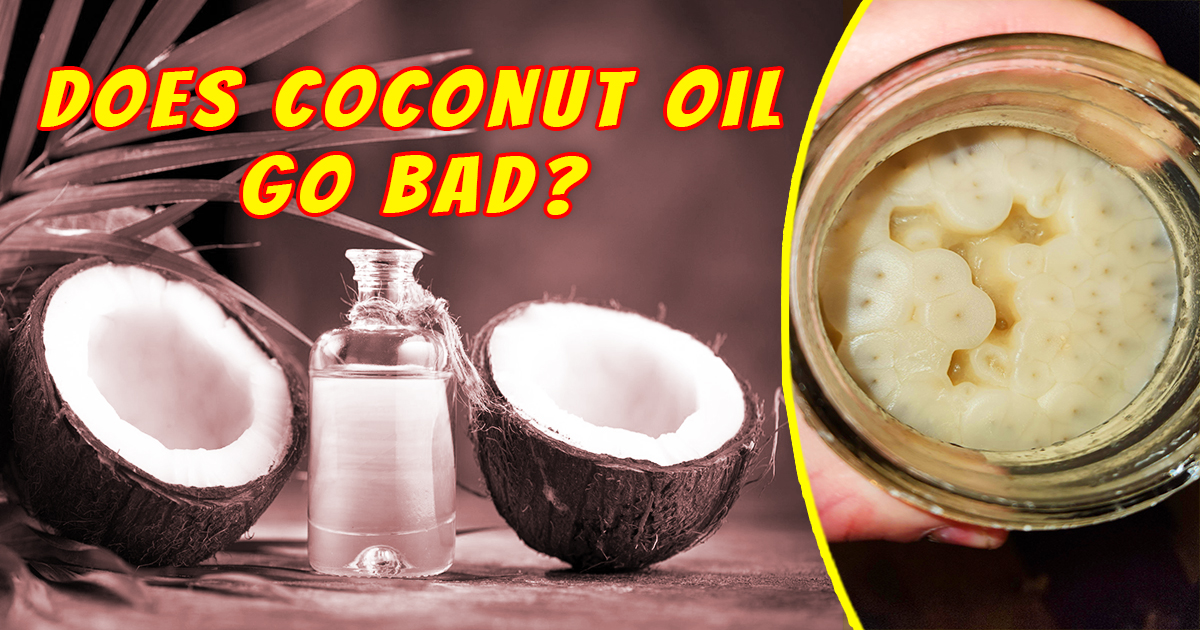Coconut oil has become a staple in many households, praised for its versatility in the kitchen and as a beauty product. Whether you use it for cooking, skincare, or haircare, its numerous benefits make it a go-to product for health-conscious individuals. However, many people wonder: does coconut oil go bad? Understanding the shelf life of coconut oil is essential to ensuring its quality and safety. In this article, we’ll dive into whether coconut oil expires, how to tell if it has gone bad, and tips for proper storage to keep it fresh for as long as possible.
What is Coconut Oil?
Coconut oil is a natural oil extracted from the meat of mature coconuts. It is commonly used in cooking, baking, and as a moisturizer for skin and hair. This oil is rich in medium-chain fatty acids, particularly lauric acid, which is known for its antibacterial and antiviral properties. Coconut oil comes in different forms, including virgin (or unrefined) and refined varieties, and each has its own unique characteristics.
- Virgin (Unrefined) Coconut Oil: This type of coconut oil is extracted from fresh coconut meat without the use of high heat or chemicals. It retains the natural coconut flavor and aroma and is considered the purest form of coconut oil. Because it is less processed, it typically has a shorter shelf life compared to refined coconut oil.
- Refined Coconut Oil: Refined coconut oil is made from dried coconut meat, also known as copra. It goes through a refining process, which involves bleaching and deodorizing the oil. As a result, refined coconut oil has a neutral flavor and scent, making it more suitable for high-heat cooking. Due to the refining process, refined coconut oil usually has a longer shelf life than virgin coconut oil.
Shelf Life of Coconut Oil: How Long Does It Last?
Coconut oil, like any other oil, has a limited shelf life. However, its high saturated fat content makes it more stable and resistant to oxidation compared to other oils like olive or vegetable oil. So, does coconut oil go bad? The shelf life of coconut oil can vary depending on whether it’s refined or unrefined, as well as how it’s stored.
How Long Does Coconut Oil Last?
- Virgin Coconut Oil: Typically, virgin coconut oil lasts about 2 to 3 years if stored properly. The natural antioxidants in virgin coconut oil help slow down the oxidation process, but exposure to heat, light, and air can speed up spoilage.
- Refined Coconut Oil: Refined coconut oil usually has a longer shelf life than virgin oil due to the refining process, which removes impurities. This type of coconut oil can last up to 4 to 5 years when stored in optimal conditions.
Factors Affecting Shelf Life
Several factors influence how long your coconut oil will last:
- Temperature: Storing coconut oil in a warm environment can cause it to spoil more quickly. The oil should be kept at room temperature or slightly cooler.
- Exposure to Light: Light exposure can accelerate the oxidation process, causing coconut oil to degrade. It’s best to store it in a dark place or an opaque container.
- Container Type: The type of container you store coconut oil in can also affect its longevity. Glass containers are generally better than plastic, as plastic may leach chemicals into the oil over time, especially in high temperatures.
Signs That Coconut Oil Has Gone Bad
So, does coconut oil go bad? While coconut oil is relatively stable, it can still spoil if not stored properly or if it’s been sitting around for too long. Here are some key signs to watch out for:
1. Changes in Color
Fresh coconut oil has a clear or white appearance when solid and a clear, slightly yellowish hue when in liquid form. If your coconut oil has turned yellow, brown, or any other unusual color, it’s a sign that the oil has started to go rancid. Any significant discoloration indicates oxidation, which means the oil is no longer safe to use.
2. Altered Texture
Coconut oil solidifies at cooler temperatures (below 76°F or 24°C), and this is normal. However, if the texture of your oil seems unusually lumpy, grainy, or chunky even at room temperature, it might be a sign of spoilage. Fresh coconut oil should be smooth when melted and firm but smooth when solid.
3. Unpleasant Smell
One of the easiest ways to tell if your coconut oil has gone bad is by smelling it. Fresh virgin coconut oil has a mild, pleasant coconut aroma, while refined coconut oil is mostly odorless. If your oil smells sour, musty, or rancid, it’s time to throw it out. A bad smell is a clear sign that the oil has oxidized or become contaminated by bacteria.
4. Off Taste
If you’re unsure about the state of your coconut oil, you can also do a taste test. Fresh coconut oil has a mild, clean flavor. If it tastes bitter, soapy, or stale, it’s likely gone bad. Do not consume coconut oil that tastes off, as it can upset your stomach or cause digestive issues.
5. Mold or Bacteria Growth
In rare cases, mold or bacteria can grow in coconut oil, especially if it’s been exposed to moisture. If you notice any green, black, or white spots on the surface of the oil, it’s a clear indication that the oil has become contaminated and should be discarded immediately. For more on oil contamination, visit this health resource.
How to Properly Store Coconut Oil to Extend Its Shelf Life
Proper storage is key to extending the shelf life of your coconut oil. With a few simple steps, you can keep your coconut oil fresh and safe to use for a longer period of time.
Store at Room Temperature
Coconut oil should be stored at room temperature in a cool, dark place, such as a pantry or cupboard. Avoid exposing the oil to direct sunlight or excessive heat, as this can cause it to spoil faster. While coconut oil can solidify in cooler temperatures, this is a natural process and does not affect its quality.
Use Airtight Containers
Always store your coconut oil in an airtight container to minimize exposure to air, which can accelerate oxidation. Glass containers are ideal, as they are non-reactive and won’t leach chemicals into the oil, unlike plastic containers.
Avoid Contaminating the Oil
One of the most common causes of spoilage in coconut oil is cross-contamination. Always use a clean, dry spoon or utensil when scooping out coconut oil to avoid introducing moisture or bacteria into the container. Never dip wet utensils into the oil, as water can encourage the growth of mold or bacteria.
Should You Store Coconut Oil in the Fridge?
While coconut oil can be stored in the refrigerator, it’s not necessary and may make the oil difficult to use since it will harden in cold temperatures. If you live in a particularly hot climate or want to extend the shelf life of your coconut oil, storing it in the fridge can help, but it’s important to let the oil soften at room temperature before using it.
Can You Use Expired Coconut Oil?
If you’ve discovered that your coconut oil is past its expiration date, you might be wondering whether it’s still safe to use. Here’s what you need to know:
Expired Coconut Oil for Non-Food Uses
If your coconut oil has expired but hasn’t gone rancid, it may still be safe for non-consumable uses, such as a moisturizer or hair treatment. As long as the oil hasn’t developed an unpleasant smell, taste, or appearance, you can continue using it in your beauty routine.
Risks of Using Rancid Coconut Oil for Cooking
It’s important to avoid using rancid coconut oil for cooking or consuming it in any way. Spoiled oil can contain harmful free radicals that can damage your health. Additionally, rancid coconut oil can cause digestive problems and may give your food an unpleasant taste.
Other FAQs About Coconut Oil Expiration
Does Freezing Coconut Oil Extend Its Shelf Life?
Yes, freezing coconut oil can help extend its shelf life, especially if you’ve purchased it in bulk and want to preserve it for future use. When frozen, coconut oil can last for several years. Just be sure to thaw it at room temperature before using it to avoid altering its texture.
Does Melted Coconut Oil Go Bad Faster?
No, melted coconut oil doesn’t go bad faster on its own. Coconut oil naturally melts when the temperature exceeds 76°F (24°C). However, if you repeatedly melt and solidify the oil, it may affect its quality over time. Be sure to store it properly to prevent spoilage.
Can You Use Coconut Oil That Has Separated?
Yes, separation in coconut oil is normal, especially in unrefined varieties. The oil may naturally separate into layers due to changes in temperature. Simply stir the oil to reincorporate the layers, and it will be safe to use.
Conclusion
So, does coconut oil go bad? Yes, coconut oil can go bad, but with proper storage and care, it has a long shelf life. Knowing the signs of spoilage—such as changes in color, smell, texture, and taste—can help you determine when it’s time to replace your coconut oil. To extend the shelf life, store your oil in a cool, dark place, and always use clean utensils when handling it. While expired coconut oil can still be used for non-food purposes, it’s important to avoid consuming rancid oil to protect your health.
By following these tips, you can enjoy the many benefits of coconut oil for years to come.
For more interesting facts and tips visit our homepage.




